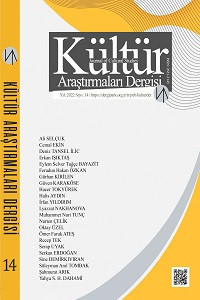Bakhtin’in Karnaval ve Grotesk Beden Kavramları Işığında Havva’nın Karnavalesk İsyanı Üzerine Bir Çalışma
Bu çalışmanın amacı, 17. yüzyıl İngiliz Edebiyatı yazarlarından John Milton’ın Paradise Lost (Yitirilmiş Cennet) şiirini özellikle, insan ırkının düşüşünü ve bu düşüşün nedenlerini ele alan ve şiirin kilit noktası olarak düşünülen IX. Kitap’taki, Havva karakterini, Rus edebiyat ve kültür kuramcısı ve dil felsefecisi Mikhail Bakhtin’in karnaval kavramını ve karnaval ile ilişkili grotesk tanımını göz önüne alarak incelemektir. Bakhtin, Rabelais ve Dünyası adlı eserinde, grotesk gerçekçilikte, bedensel unsurun son derece olumlu olduğunu vurgular. Bu, hayatın diğer alanlarından kopuk ve mahrem olarak değil, tüm halkı temsil eden evrensel bir şey olarak sunulur. Bu makalede, Milton’ın, erkek egemen ideolojinin yaratmış olduğu düzenden sapan kadını, Havva’yı, grotesk kavramını olumsuzlaştırarak ve eserde sadece bir iki kitapta bahsi geçen, Şeytan’ın kızı ve sevgilisi olan Günah’ı, kadınlık/annelik çerçevesinde Havva ile ilişkilendirerek, canavarımsı bir kadın olarak nasıl ve neden sunduğu ele alınmaktadır. Aslında, karnaval ruhu ve grotesk gerçekçilik, kadın-erkek cinsiyet farkı ile belirlenmiş bedenleri değil de, genel anlamda bedenleri içerdiği halde; benim bu incelemedeki amacım, grotesk imgelerin, kadınla ve özellikle ataerkil ideolojinin belirlediği normlardan sapan ve erkek egemen düzene bir tehlike oluşturduğu düşünülen kadınlarla bağlantılı olarak kullanıldığını göstermektir. Bu durumda, Havva, başkaldırıcı tavrı ile bir karnaval karakteridir diyebiliriz, çünkü Baba Tanrı tarafından temsil edilen düzeni, Adem’i de kandırarak, karnavalımsı bir atmosfer içinde yerle bir eder.
Anahtar Kelimeler:
Adem ve Havva, Yitirilmiş Cennet, Bakhtin, karnaval, grotesk beden temsili
A Study of the Carnivalesque Rebellion of Eve Through Bakhtin’s Notions of the Carnival and the Grotesque Body
This study aims to explore the grotesque mode of representing the female body and bodily life in John Milton’s Paradise Lost, especially in Book IX, which is regarded to be the key book of the poem: the book of Man’s Fall. My main purpose is to display from a Bakhtinian perspective how the grotesque concept of the female body operates as a considerable way of representing the “monstrous-feminine.” That is, the female, in the character of Eve and in some places, of Sin, in relation to their femininity/maternity, deviates from the norm established by patriarchal male ideology and poses a constant threat to the male order. Predicating upon Bakhtin’s notion of the carnival in its alliance with the grotesque image of the body, I argue that although for Bakhtin, the “bodily element” of the carnival and grotesque realism dwells upon bodies in general and not upon bodies as determined by gender, the grotesque images can be associated with the feminine, particularly with those females who revolt against male domination. Thus, in this particular study, the body of the nonconformist female who stands for a fearful and threatening form of sexuality, will be discussed as “grotesque.” I also contend that in Paradise Lost, Eve, as well as Adam, by tasting the forbidden fruit, embraces a world turned upside down in which the marginalized and suppressed overthrow the order represented by God.
Keywords:
Adam and Eve, Paradise Lost, Bakhtin, carnival, grotesque body representations,
___
- Babcock Gove, Philip (1966). Webster’s Third New International Dictionary of the English Language, Unabridged. Springfield, Massachusetts: G. and C. Merriam Company.
- Bakhtin, Mikhail (1984a). Problems of Dostoevsky’s Poetics: Theory and History of Literature, Vol. 8. Ed. & Trans. Caryl Emerson. Manchester: Manchester University Press.
- Bakhtin, Mikhail (1984b). Rabelais and His World. Trans. Hélène Iswolsky. Bloomington: Indiana University Press.
- Benton, William (1959). Encyclopedia Britannica, Vol. 4 and Vol. 10. USA: Chicago, London, Toronto: Author.
- Butler, Judith (1990). Gender Trouble: Feminism and the Subversion of Identity. New York & London: Routledge.
- Cavanagh, Shelia T. (1994). Wanton Eyes and Chaste Desires: Female Sexuality in The Faerie Queene. Bloomington, Indianapolis: Indiana University Press.
- Creed, Barbara (1993). The Monstrous Feminine: Film, Feminism, Psychoanalysis. London & New York: Routledge.
- Cuddon, J. A. (1979). A Dictionary of Literary Terms (Revised ed.). London: André Deutsch Ltd.
- Danow, David K. (1995). The Spirit of the Carnival: Magical Realism and the Grotesque. Kentucky: The University Press of Kentucky.
- Freud, Sigmund (1933). “Femininity”. The Essentials of Psycho-Analysis: The Definitive Collection of Sigmund Freud’s Writing. Trans. James Strachey. Ed. Anna Freud (1991). London: Penguin, 412-432.
- Hirschkop, Ken (1999). Mikhail Bakhtin: An Aesthetic for Democracy. New York: Oxford University Press.
- Kristeva, Julia (1980). Desire in Language: A Semiotic Approach to Literature and Art. Ed. Leon S. Roudiez. New York: Columbia University Press.
- Kristeva, Julia (1982). Powers of Horror: An Essay on Abjection. Trans. Leon S. Roudiez. New York: Columbia University Press.
- Lechte, John (1994). Fifty Key Contemporary Thinkers: From Structuralism to Postmodernity. London & New York: Routledge.
- Lerner, Gerda (1986). The Creation of Patriarchy. New York, Oxford: Oxford University Press.
- Milton, John (1996). Paradise Lost. England: Penguin Popular Classics.
- Nead, Lynda (1992). The Female Nude: Art, Obscenity, and Sexuality. London: Routledge.
- Nietzsche, Friedrich (1995). The Birth of Tragedy. Trans. Clifton P. Fadiman. Canada: Dover Thrift Editions.
- Paglia, Camille (1990). Sexual Personae: Art and Decadence from Nefertiti to Emily Dickinson. New Haven, CT: Yale University Press.
- Russo, Mary (1995). The Female Grotesque: Risk, Excess and Modernity. New York London: Routledge.
- Stallybrass, Peter (1986). “Patriarchal Territories: The Body Enclosed”. Rewriting the Renaissance: The Discourses of Sexual Difference in Early Modern Europe. Eds. Margaret Ferguson, et. al. Chicago: Chicago University Press, 123-142.
- Stam, Robert (1989). Subversive Pleasures: Bakhtin, Cultural Criticism, and Film. Baltimore: John Hopkins UP.
- The New English Bible (1970). Oxford & London: Cambridge University Press & Oxford University Press.
- URL-1: Harper, Douglas. “Monster”. Online Etymology Dictionary. https://etymonline.com/search?q=monster (Access: 07.06.2022).
- URL-2: Harper, Douglas. “Wisdom”. Online Etymology Dictionary. https://etymonline.com/word/wisdom (Access: 12.06.2022).
- Vice, Sue (1997). Introducing Bakhtin. Manchester and New York: Manchester University Press.
- Whites, Allon & Stallybrass, Peter (1986). The Politics and Poetics of Transgression. London: Methuen.
- ISSN: 2651-3145
- Yayın Aralığı: Yılda 4 Sayı
- Başlangıç: 2018
- Yayıncı: Mehmet Ali YOLCU
